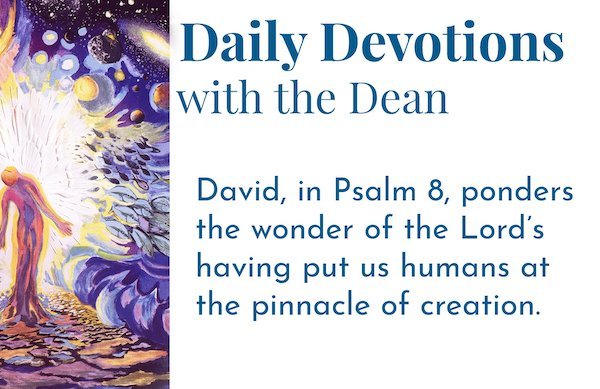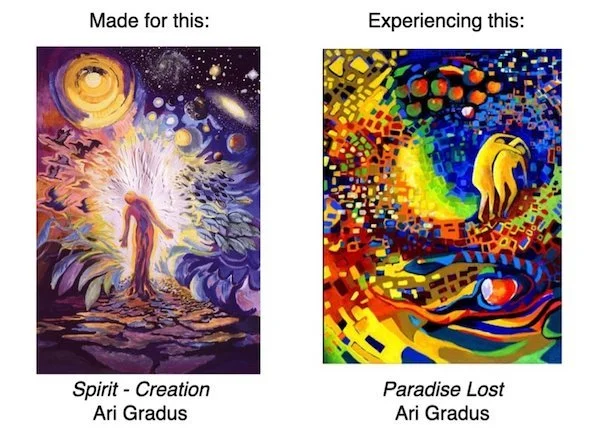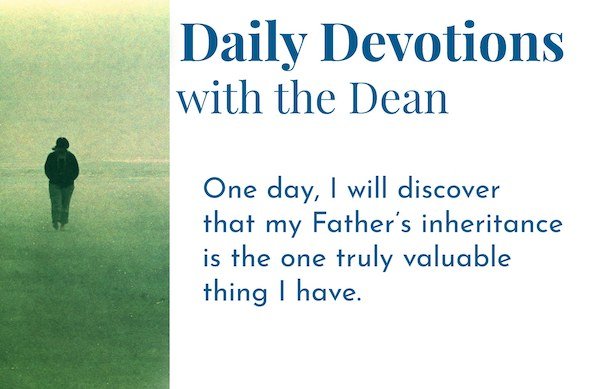Monday • 5/13/2024 •
Monday of the 7th Week of Easter
This morning’s Scriptures are: Psalm 89:1-18; Joshua 1:1-9; Ephesians 3:1-13; Matthew 8:5-17
This morning’s Canticles are: before the Psalm reading, Pascha Nostrum (“Christ Our Passover,” BCP, p. 83); following the OT reading, Canticle 9 (“The First Song of Isaiah,” Isaiah 12:2–6, BCP, p. 86); following the Epistle reading, Canticle 19 (“The Song of the Redeemed,” Revelation 15:3–4, BCP, p. 94)
Today’s lesson: It’s not just that I read, but how I read.
Read slowly. “… you shall meditate on it day and night…” — Joshua 1:8. Joshua is given formidable tasks and stupendous promises. And he’s given one principal resource: “all the law that my servant Moses commanded you … this book of the law.” The key to success in the tasks at hand lies in not deviating from what’s in that book. For all the verbal instructions that Yahweh will provide, he has revealed his heart and his mind, and has laid out the shape of relationship with him, in the written word. And that word must be internalized, taken in slowly, and “chewed on” (the literal meaning of the Hebrew word translated “meditate on”).
So, the notion of the word “not depart[ing] out of your mouth” is graphic. Of course, in the abstract, it means “think about it” all the time. But the concrete image is quite vivid: “chew on it,” the way a cow chews its cud, or a dog worries its bone. That sort of reading presupposes reading slowly and reflectively. It calls for committing thoughts and phrases to memory, and for rolling them over on the tongue. It means constantly pondering their significance. It does not mean breezing through passages to put a check mark on a to-do list. That’s easy to do in an exercise like the Daily Office. Which is why I often have to make myself slow down, reread, and ask the Lord what I’m supposed to be getting today, as I look for key phrases to jump out and grab me.
Image: Adaptation, "Roman centurion at the Coliseum, Rome" by Andrew & Suzanne is licensed under CC BY-NC 2.0.
It means committing some passages to memory. Good candidates from today’s reading in Joshua are:
“This book of the law shall not depart out of your mouth; you shall meditate on it day and night, so that you may be careful to act in accordance with all that is written in it. For then you shall make your way prosperous, and then you shall be successful.” (Joshua 1:8)
and:
“I hereby command you: Be strong and courageous; do not be frightened or dismayed, for the Lord your God is with you wherever you go.” (Joshua 1:9)
Read, looking for the mystery. “…a reading of which will enable you to perceive my understanding of the mystery of Christ…” — Ephesians 3:4. Besides reading slowly, today’s passages commend a certain purpose in reading: looking for what God would reveal to you and to me about his Son, and about the way he is making all things new through his Son.
For Paul, there is a twofold “mystery” hidden throughout the Old Testament, now being revealed for the world. That mystery is Christ and his Church. For example, in the first place, “Joshua” (translated “Jesus” in the Greek Old Testament) pictures ahead of time the One who will bear the same name when he comes to earth to conquer sin and death—as Paul describes the “mystery” in Colossians: “Christ in you, the hope of glory” (Colossians 1:27). In the second place, as the nation of Israel enters the Promised Land to become a colony of God’s rule, she depicts in advance Jesus’s Church growing into a house for God’s dwelling (Ephesians 2:22): “the mystery of Christ…that is, the Gentiles have become fellow-heirs, members of the same body, and sharers in the promise in Christ Jesus through the gospel” (Ephesians 3:4b, 6).
A Christ-filled interpretive imagination can get carried away with itself, of course (early theologians could find Christ’s blood in Rahab’s red rope). But our imaginations can also become dull to the fact that “the ends of the ages” have fallen upon us (1 Corinthians 10:11). We can too easily forget that, at its heart, the whole of the Bible points to Christ. I should read, asking Christ to show himself and what he’s doing to bring people into fellowship with him and with one another. And then for him to show me where I fit in those purposes—even in what lies ahead today.
Read as under authority. Centurion: “For I also am a man under authority” … Jesus: “Truly I tell you, in no one in Israel have I found such faith.” — Matthew 8:9a, 10b. Finally, I need to read, expecting marching orders! This centurion was accustomed to responding to superiors who communicated to him through messengers. He knew that Jesus, like the centurion’s own superiors, spoke with such authority that Jesus wouldn’t physically need to be some place for his commands to be enforced.
The faithful centurion knew that dutiful messengers don’t speak for themselves. We know that faithful Scripture writers don’t either. When I read them, I need to listen for the voice of their Master and mine. As Peter puts it: “It was not on any human initiative that prophecy came: rather, it was under the compulsion of the Holy Spirit that people spoke as messengers of God” (2 Peter 1:21 REB).
From the Catechism in the Book of Common Prayer.
Q. Why do we call the Holy Scriptures the Word of God?
A. We call them the Word of God because God inspired their human authors and because God still speaks to us through the Bible.
Be blessed this day,
Reggie Kidd+














